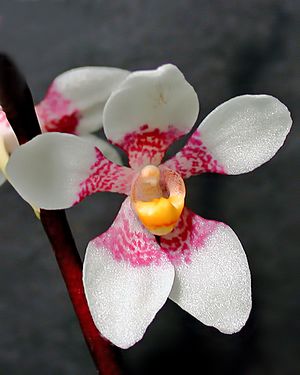Ravine orchid facts for kids
Quick facts for kids Ravine orchid |
|
|---|---|
 |
|
| Conservation status | |
| Scientific classification | |
| Genus: |
Sarcochilus
|
| Species: |
fitzgeraldii
|
| Synonyms | |
|
|
The ravine orchid, also known as Sarcochilus fitzgeraldii, is a beautiful orchid that grows on rocks. It is found only in eastern Australia. This special plant forms large groups with dark green leaves. It has up to fifteen white flowers with bright crimson spots in the middle.
Contents
What Does the Ravine Orchid Look Like?
The ravine orchid is a plant that grows on rocks. It forms big clumps with stems that can be 200 to 500 millimeters (about 8 to 20 inches) long. Each plant has four to eight dark green leaves. These leaves are long and thin, measuring 100 to 200 millimeters (about 4 to 8 inches) long and 10 to 15 millimeters (about 0.4 to 0.6 inches) wide.
The orchid produces an arching flower stem, 100 to 250 millimeters (about 4 to 10 inches) long. On this stem, you can find four to fifteen white flowers. Each flower is about 25 to 30 millimeters (about 1 to 1.2 inches) long and wide. They have many crimson (deep red) spots near their center.
The flower has parts called sepals and petals. These are 12 to 17 millimeters (about 0.5 to 0.7 inches) long. The petals are a bit narrower than the sepals. The flower also has a thick, waxy part called a labellum. It is about 5 millimeters (0.2 inches) long and 7 millimeters (0.3 inches) wide. This labellum has three sections. The side sections stand up, and the middle section is short and fleshy. Ravine orchids usually bloom between October and November.
Where Does the Ravine Orchid Live?
The ravine orchid typically grows on rocks. You can find it in thick rainforests or in shady places like gorges and ravines. Sometimes, it also grows on the bottom of trees with rough, fibrous bark.
This orchid is found in a specific area of Australia. It lives between Maleny in south-east Queensland and the Macleay River in New South Wales.
How Was the Ravine Orchid Named?
The ravine orchid was officially described in 1870. A scientist named Ferdinand von Mueller gave it its formal name, Sarcochilus fitzgeraldii. He published his description in a book called Fragmenta phytographiae Australiae.
The plant was found near the Bellinger River by Robert Fitzgerald. The second part of its name, fitzgeraldii, honors him. It's a way to remember the person who first collected this type of plant.
Protecting the Ravine Orchid
The ravine orchid is considered "vulnerable." This means it is at risk of becoming endangered if we don't protect it. Both the Australian Government and the New South Wales Government have laws to protect this orchid. These laws are the Environment Protection and Biodiversity Conservation Act 1999 and the Biodiversity Conservation Act 2016.
The biggest danger to the ravine orchid is people illegally collecting it. In the past, there were many of these orchids. However, too many have been taken from their natural homes. This is why it is now a protected species.


